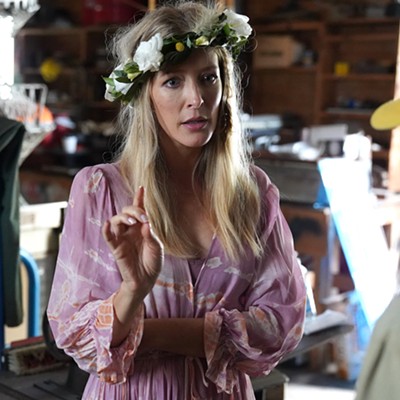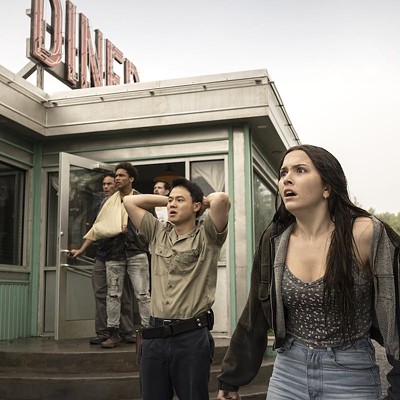Broken Flowers
Don Johnston is the type of character Bill Murray has played a lot recently—generally indifferent to his surroundings. As Broken Flowers begins, his fed-up girlfriend leaves him. He then receives an unsigned note from an ex, claiming to have mothered his son. Don doesn’t want to get involved. With his mystery-obsessed family-man neighbour (Jeffrey Wright) continually bringing up the matter, he eventually accepts it as a means to will himself into taking interest in life. The “straight” narrative that Jim Jarmusch runs through Broken Flowers takes on the director’s impulse of breaking his films into a series of vignettes. The exes Don meets greet him with independent disconnection—from belaboured affection to casual politeness to radical life changes. As he had presumed with each failed relationship to have at least bettered these women with his legacy, the only one to appear affected is openly hostile. This is sharply focused, but also thin: rather than multifaceted, Broken Flowers is only concerned with how its events impact its lead. Jarmusch’s hypnotic approach isn’t blessed with as rounded a social collision as Mystery Train and Night on Earth but it is the best of his post-Dead Man output. In Don’s uncertainty of why he should care, Jarmusch articulates that the search for meaning is fruitless without a clear desire to find the answer.
The Great Raid
John Dahl’s career took off with made-for-cable productions that were later picked up theatrically but The Great Raid is his first movie to play like conventional TV. For every classically lit shot that looks pulled from vintage Hollywood war films, there’s a confined and deeply impersonal sense to the project. The story, a dramatization of events in 1945, is set in a Phillipine-based Japanese stronghold where US prisoners were held and starved. The decision to have The Great Raid narrated by an American captain played by James Franco should have given the film a succinct angle but the character is minor and without distinctive insight. Also, like those early war films, the perspective never moves past American courage and victory. Dahl shuffles between three storylines: the POWs, the Americans planning to rescue them and the efforts of a female spy (Connie Nielsen) to smuggle medicine into the camp. For a while, the balancing act is intriguing. The suspicion that Dahl will provide a war movie without major action scenes upholds the noir streak that’s run through Red Rock West to Joy Ride, even if the black and white morality contradicts that approach. By the end, the threads have come loose and as the film is missing a moment where the Japanese are allowed to be more than heartless monsters. It’s unclear whether The Great Raid’s shallowness is meant as a deliberate throwback. In either case, it stumbles into a great letdown.
The Dukes of Hazzard
Jessica Simpson’s bombshell posture and walking boots have been the commercial draw of this take on early-’80s staple The Dukes of Hazzard. Honest advertising would indicate that Simpson’s turn as Daisy Duke is an extended cameo, but then there’s nothing left to sell. The Dukes of Hazzard is a movie in the sense that it is composed of recorded events, gets projected on a screen and can be viewed as a continuum. Much of it is good-natured, it occasionally elicits a chuckle, yet there’s so little to it, it threatens to evaporate. There’s a period in the middle, as cousins Bo (Seann William Scott) and Luke (Johnny Knox-ville) take their Dodge Charger on a road trip to an Atlanta university, where director Jay Chandrasekhar breaks into the inspired hijinks that made for the redeemable bits of Club Dread. The surrounding 90 minutes are wall-to-wall double-entendres, pratfalls and screeching tires. Exerting full concentration on it is almost as maddening as trying to replay the thing through your head later.












